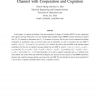Free Online Productivity Tools
i2Speak
i2Symbol
i2OCR
iTex2Img
iWeb2Print
iWeb2Shot
i2Type
iPdf2Split
iPdf2Merge
i2Bopomofo
i2Arabic
i2Style
i2Image
i2PDF
iLatex2Rtf
Sci2ools
111
click to vote
CORR
2008
Springer
2008
Springer
Degrees of Freedom of the MIMO Interference Channel with Cooperation and Cognition
In this paper, we explore the benefits, from the perspective of degrees of freedom (DOF), of user cooperation and cognitive message sharing for a two-user multiple-input-multiple-output (MIMO) Gaussian interference channel with M1, M2 antennas at transmitters and N1, N2 antennas at receivers. For the case of user cooperation (including cooperation at transmitters only, at receivers only, and at transmitters as well as receivers), the sum DOF is min{M1 +M2, N1 +N2, max(M1, N2), max(M2, N1)}, which is the same as the sum DOF of the channel without cooperation. For the case of cognitive message sharing, the sum DOF is min{M1 + M2, N1 + N2, (1 - 1T 2)((1 1R2) max(M1, N2) + 1R2(M1 + N2)) + 1T 2(M1 + M2), (1 - 1T 1)((1 - 1R1) max(M2, N1) + 1R1(M2 + N1)) + 1T 1(M1 + M2)} where 1T i = 1 (0) when transmitter i is (is not) a cognitive transmitter and 1Ri is defined in the same fashion. Our results show that while both techniques may increase the sum capacity of the MIMO interference channel, on...
CORR 2008 | Education | Sum Dof | Transmitter | User Cooperation |
Related Content
| Added | 09 Dec 2010 |
| Updated | 09 Dec 2010 |
| Type | Journal |
| Year | 2008 |
| Where | CORR |
| Authors | Chiachi Huang, Syed Ali Jafar |
Comments (0)

